Steve woke from his drug-induced stupor in a hospital in Liverpool.
Repeated and prolonged drug use had led to the veins in his arms and legs shutting down, to the point where he had ended up injecting heroin into his groin.
Lying stricken in a hospital bed, a shot of adrenaline brought him around, and the doctor told him he was lucky to be alive and that he was to be kept in overnight for observation.
But that didn’t really sink in for Steve. That didn’t really matter.
He had something else on his mind. Something far more pressing and important.
“As soon as I opened my eyes I was withdrawing,” he recalls.
“When the doctor said that to me I thought, ‘well o-k then’, but the first thing on my mind was that I needed to score.
“I didn’t like withdrawing, I felt uncomfortable, so yes, I needed to score, and the sooner the better.
“I walked out of hospital, still on a drip, to the nearest estate which was notorious for drugs and all sorts of other stuff.
“I went over there, I scored, and then went back to the hospital.
“That just shows how powerful drugs can be, and how much they can take hold on you, so that nothing else matters.
“There have been many times when I have nearly died, and the doctors and the NHS have brought me back.
“By rights, I really shouldn’t be here today. By rights I should probably be dead.”
Fast forward almost two decades, to last November’s first ever Molineux Sleepout, a link-up between the Good Shepherd and Wolves Foundation which saw a large number of people spending a night sleeping outside at the football stadium to raise funds.
A crowd had gathered, including former Wolves players Matt Murray, Carl Ikeme and Karl Henry, the club’s Sporting Director Kevin Thelwell, well-known TV presenter and furniture restorer Jay Blades, and two very popular names in different sectors of the music industry in Jaki Graham and Producer S-X.
Normally at Molineux it is the Scouse tones of Wolves captain Conor Coady that can be heard booming around the stadium, but, on this occasion, it was another voice from Merseyside – a proud Liverpool fan to boot – who was holding court.
Steve told his story, somehow, cramming it all into ten brutally honest, powerful and emotional minutes. And you could have heard a pin drop.
This was no-holds barred, and the language was sometimes fruity, but those listening in were spell-bound, many perhaps hearing for the very first time just how far a human being can fall, yet still be here to tell the tale afterwards.
It was also, Steve noted, the first time he had ever ‘slept rough’ while being clean and not under the influence.
By this point, he was speaking as a vital and hugely valued member of the small but extremely tight-knit Good Shepherd staff.
As a Key Worker, Steve spends every day talking, advising, encouraging, helping those who themselves have fallen on hard times for one reason or another.
Just like he did himself, many years ago.
Growing up in Liverpool there was perhaps little sign of the trials and tribulations which were to follow for a young boy who remembers being very kind, warm and affectionate, whilst not receiving the love that he might have wanted from a mother and father who were both chronic alcoholics.
Steve did go on to enjoy what he would initially term a ‘normal life’, carrying out various job roles including working on a building site.
However, once addiction arrived, it was to take over, and that ‘normal life’ would never be the same again.
“I felt so powerless, so powerless,” Steve repeats, recalling the times he has fallen into drug addiction, and all the associated issues with crime which followed.
“With my addiction I lost everything – my family, my friends, you name it, all that mattered to me was drugs.
“All I was thinking about was where I could get my next fix from, and it didn’t matter who I hurt along the way.
“I lost any sense of caring, whether for myself or for anyone else.
“It was just all about getting those drugs into my system without ever realising or thinking about how much I was poisoning my body and my mind for so many years.
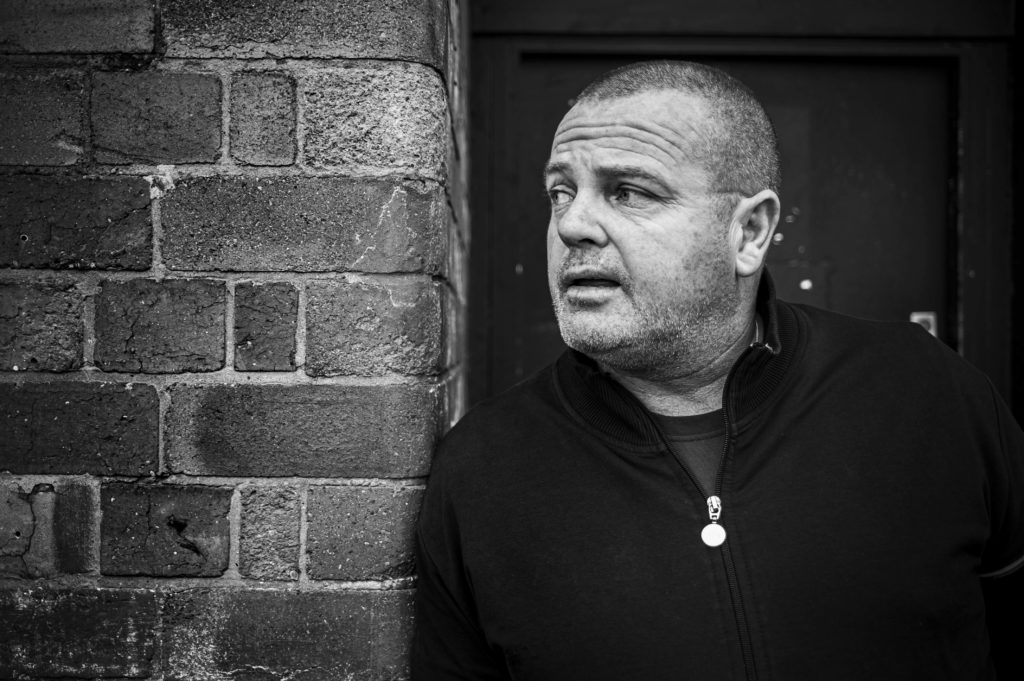
“The pull of the drugs was just way too powerful and even at times that wasn’t enough as I was constantly chasing that high and never getting it so I’d be injecting and stabbing away at my body with pins.
“My addiction led to me being on the streets and homeless, in and out of hostels, in and out of prisons.
“I spent so much time in institutions and it was dog-eat-dog.
“It was tough, and I had to learn to survive, and recovery is never easy – I have had so many relapses and overdoses along the way.”
Coming through addiction is certainly a long and troublesome old journey, with many bumps in the road.
There are very few Disney stories where, all of sudden, lives are immediately transformed. And the past forgotten.
And that has been the case for Steve, with many hurdles to overcome during his recovery, not to mention many people helping him along the way.
There is Sheila, the Methodist pastor, who was helping the homeless and arranged some voluntary work for Steve as well as the chance to attend fellowship groups and Narcotics and Alcoholics Anonymous sessions.
And then there is also Nicky, the friend who first invited him to move down from Liverpool to Birmingham, a change in location which kicked off the sequence of events that would ultimately bring Steve to where he is now, and the life he has now, working for the Good Shepherd and living a quiet existence not far from the town centre within walking distance of a nature reserve.
No more chaos, just peace and tranquillity.
“I had spells when I was trying to recover when I’d go maybe a year clean before relapse, 18 months clean, even two years, but then I would fall back,” Steve explains.
“I kept trying, and I learned massively from all of the different experiences.
“A couple of years ago I was still in Liverpool, and all those feelings started to come back.
“I just knew that I was a couple of weeks way from needing drugs again, from needing to start robberies again, kicking a few doors in and having a few dealers off.
“I have never felt fear like it, because I knew with those thoughts coming back, that I was either going to end up in jail, or I was going to end up dead.
“A mate of mine, Nicky, sent me a text and asked me how I was. ‘F****d’, I replied.
“He said I needed to get up to Birmingham, and he would pay for my ticket.
“Even sitting on the train I remember asking myself why I was going to Birmingham, what was there in Birmingham for me? I was scared.
“I arrived at New Street Station with five bin bags – that was me, all I had – and my friend put me up for a few days and then in a hotel for a few days before I got into a safehouse with other recovering addicts.
“I spent ten months in that place, I did my rattle in there, but I was in a terrible state, I was crying a lot, I hated withdrawing.
“I remember thinking: ‘Am I ever going to be able to get out of this? Will I ever be able to maintain a life in recovery, and be consistent?’
“I always struggled with that, it was a part of my own low self-esteem that I didn’t feel worthy of a normal life, with a job and a place to live – that was all alien to me.
“I had a fear of success and also a fear of failure, and my mind was looking for any excuse to avoid that normality and avoid any kind of responsibility.”
Although still feeling these thoughts, slowly but surely, Steve started to overcome his demons.
In doing so, in his own words, he started to be honest with himself for perhaps the first time in his life.
So when the opportunity arose to return to the Adelphi Hotel in Liverpool for a convention to celebrate recovering addicts, Steve politely declined.
He knew what a trip back to Liverpool would lead to, and that wouldn’t be heading to an addicts convention at the Adelphi.
Instead he concentrated on making more friends in Birmingham, negotiating his way around a new city, developing a new focus. Quite literally.
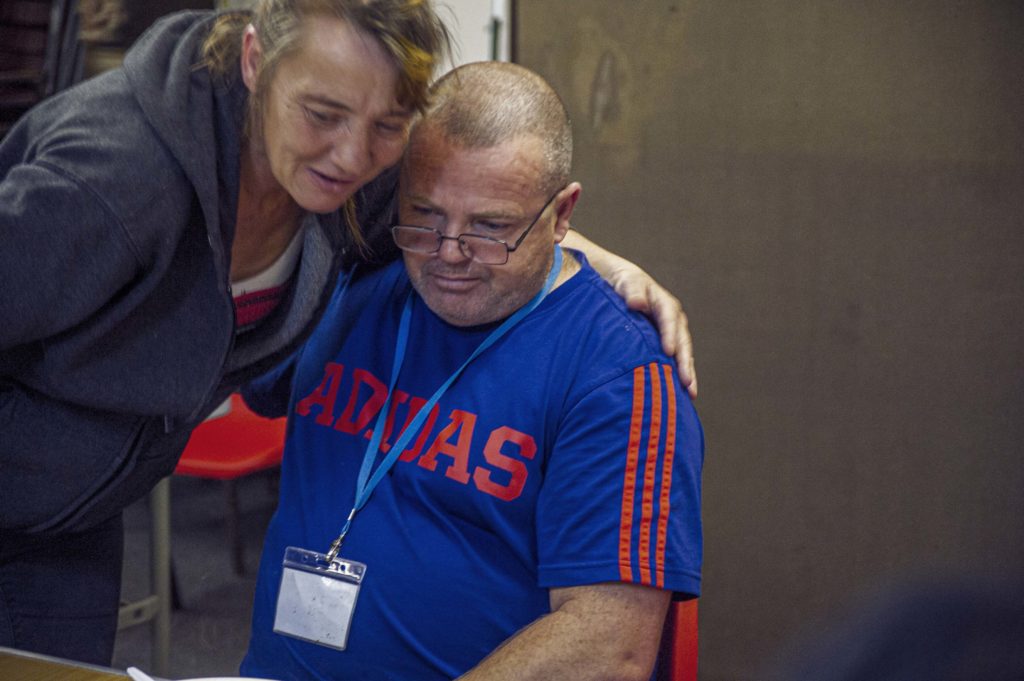
Because Steve made a video, a five-minute film about a vicar who had transformed his local community in the Second City.
He started to believe in himself again, put more work into himself and his prospects, and in doing so, rekindled a love for his family which had been on the wane since childhood.
“I am in touch with my family again and did make amends to them because they were top of the list of people I needed to make amends to,” Steve explains.
“Sadly I lost my father a couple of years ago, but he died sober.
“He had been 13 months sober, and he had seen me come through recovery myself.
“There was a lack of love and direction for me from my parents when I was growing up but, as time went on, I realised that they did their best for me.
“I carried a lot of anger and resentment towards them for a long time, hatred even, and that took me to a place where I became addicted to drugs.
“But as I moved on, I managed to let go of unnecessary fears and that hatred around my family, and I was able to understand it, and accept it.
“I have since gone on to have a great relationship with them in the end, and still enjoy getting back home when I can, walking on the beach, enjoying the sea air.
“Unfortunately there are no beaches around here are there?!”
Steve laughs. A loud and raucous laugh. But it hasn’t always been like this.
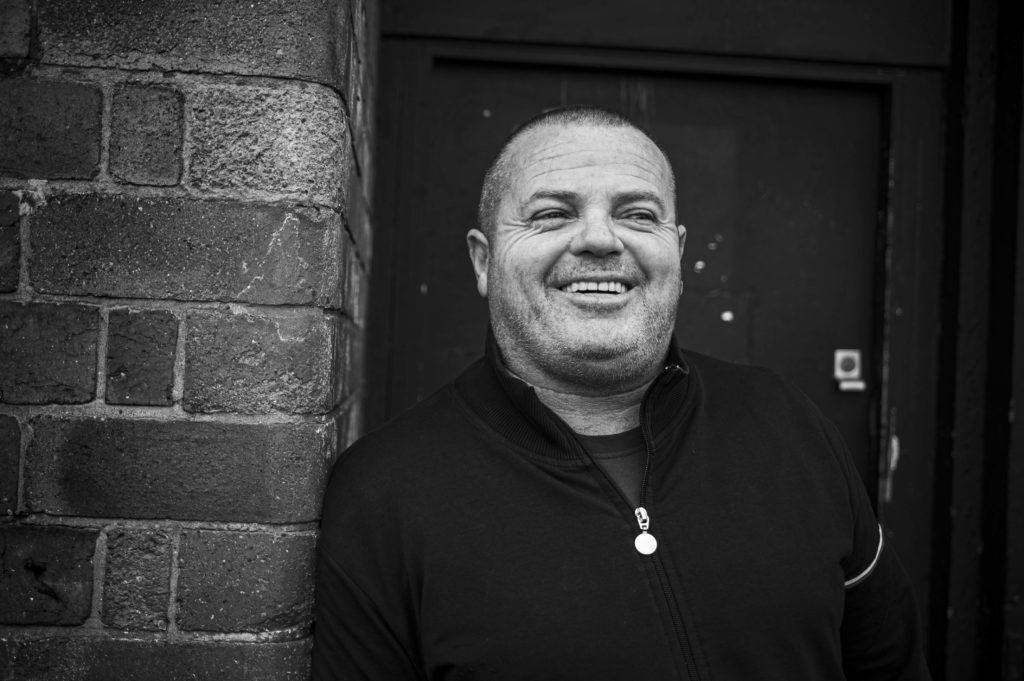
It wasn’t just to his family that Steve has made amends, but also the authorities to whom he acknowledges he inflicted plenty of trouble and strife over the years.
Whilst rebuilding his life, and as part of his recovery, he was asked to travel to Manchester to give a talk about his journey away from addiction.
“There I was,” he recalls, “sitting in front of all the Commissioners and Chief Superintendents, all the bigwigs from the Police force.
“I was full of fear, I felt intimidated, but I started off, talking about my addiction and how I felt that no one cared and I was a waste of space, not worth a carat, which I had been listening to for years.
“I was sharing that, and describing some of the things I was getting involved in, and then one of the policemen started giving it out to me, telling me they should have locked me up and thrown away the key.
“I ignored him and just carried on, and as I continued I was talking about how I had made some massive changes and managed to turn my life around, and had found a completely different perspective on life as a result of doing some work on myself and in the community.
“I started to talk about forgiveness, which was so important to me, and gradually, that policeman who had been having a go at me, his head went down.
“At the end of the talk, he came up to me, and all of a sudden it had gone from being a waste of space to: ‘Stephen, have you got a minute?’
“He was asking me about what I had been saying about forgiveness and my parents, and how I had been able to consider their childhoods – how they had been brought up and what they had been taught.
“He said ‘thank you’, because he had been abused by his father, and what I had said had given a completely new perspective on the hatred which he felt.
“He opened up to me, and that just blew me away.
“I’d been sharing with these coppers how I’d been robbing cars, getting involved in car chases, putting people’s lives in danger, both the Police and other public servants lives and also my own.
“I took responsibility for everything I had done, I owned it, and I came away that day able to make an indirect amends for all the hatred I had held for the Police.
“It was so powerful and profound, and there I was, now sitting down having lunch with commissioners and chief superintendents and thinking: ‘how the **** did I get here?’”
How did Steve get there? Well how did he get to Wolverhampton, to a new life, now being part of the Good Shepherd?
He was pointed in the direction of the charity and, having already done some work with the homeless back in Liverpool, it seemed a perfect fit.
At the same time though, as he started at the Good Shepherd on a trial basis last year, he was offered employment with the Crisis homeless charity in Birmingham.
It was a tough decision – he was keen on both – but ultimately decided to go with his ‘heart rather than his head’ and make the short move across the Midlands to Wolverhampton.
Steve is now a permanent member of the small but hugely dedicated team of key workers whom, hour after hour, day after day, work with rough sleepers and the vulnerable from across the city to try and help them through their issues, issues which Steve himself has been through so many times.
Even from spending just an hour talking to him – and he says it himself – it is clear that this is where he is meant to be, doing exactly what he is meant to do.
As well as his own lived experience of so many of the problems he is now helping with, he is constantly learning from colleagues and also improving himself via training, having now completed his Level 3 qualification in counselling.
“I want to be here for these people, the hard to reach people, I want to help them,” he says.
“They feel like pieces of shit, they think they are not worth anything, and I have been there myself.
“But we care, we love them and are there for them, however long it takes.
“People are always in different places and moving at different speeds and we have to allow them to go through their own individual processes of when they need the help to move towards developing a life worth living.
“But we will never give up on them, just like people never gave up on me.
“I get really angry sometimes, when people talk about homelessness, and the stigma attached to homeless people.
“People saying they are this or they are that, that they don’t deserve any help, when they don’t even know them, or what they might have been through.
“The people we see here are broken, just like I was, they feel they have nothing left to give.
“But they are human beings, not worthless addicts or alcoholics, they are human beings who have been through some sort of trauma in their lives and just need a helping hand.
“At the Good Shepherd we are here to give them a new start, and try and take them away from that life, we want to give them something they can enjoy, to see life as an adventure and not a chore.
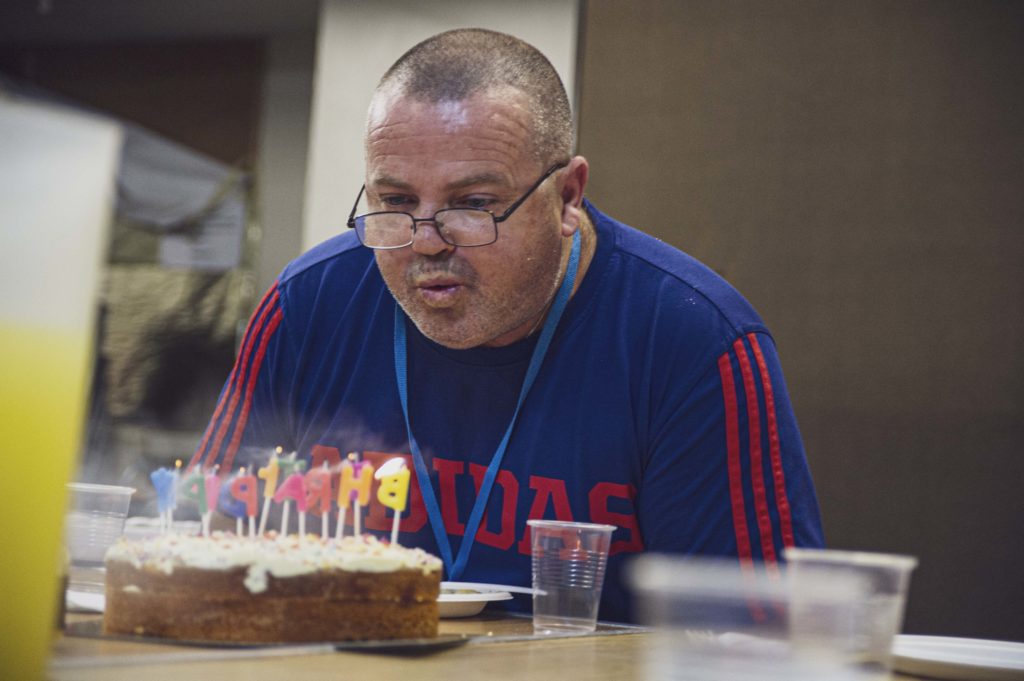
“All of these people are terrified of any kind of responsibility, they have resigned themselves to being worth nothing, but we know they are worth so much more.
“We want to take them away from that sense of feeling hopeless, and move them towards feeling hopeful, whether by getting them involved in activities, helping them move into some training or employment, or finding their own accommodation.”
Aside from the general practical support and counselling Steve passes on to service-users, he can also indulge his own passion for the big screen by leading a weekly film club (prior to lockdown), whilst also being involved in the cookery classes which form another part of the Good Shepherd’s meaningful activities programme.
And in helping others, he knows he is also helping himself, continuing on his own journey of self-awareness and feeling more comfortable in his own skin which he views as so important along his path to recovery.
“I have let go of the person I once was, and am no longer that person,” he explains.
“I am still so grateful for the experiences I have had in life because they have made me what I am today, and I am so grateful to be part of this fantastic team at the Good Shepherd.
“I love being a part of the team, I feel quite blessed and honoured that I have been asked to be a part of this, and that the people here trusted me and saw something in me that perhaps I didn’t.
“I have learned to trust myself, and I know now that I am loyal, respectful, genuine, loving and compassionate.
“I have been able to give that love to myself, and am now able to pass it on to others, and that is such a privilege.
“Don’t get me wrong, I still struggle at times, I still sometimes wonder what I am doing in life, and what is the point, but I don’t listen to that so much anymore.
“I still go to all the meetings that I need to, sharing with other people, keeping those connections going, but I know that I just have to do my best, every single day, and I can’t do any more than that.
“Listening to people is so important – I think the greatest act of love you can give anyone, is to listen to them.
“And with some of the evening groups like the film club and the cooking, so much of it is about the sitting down together to eat or watch a film, the socialising, taking people away from the misery they are feeling just for a couple of hours.
“When you see these guys feel that they have achieved something, you see their faces light up, then that is all the feedback that you need.”
Steve admits he likes to do his work in a quiet and low-profile fashion, behind the scenes, and isn’t prone to preaching or “telling every Tom, Dick and Harry” his story.
“I am as humble as can be, and no better or worse than anyone else,” he admits.
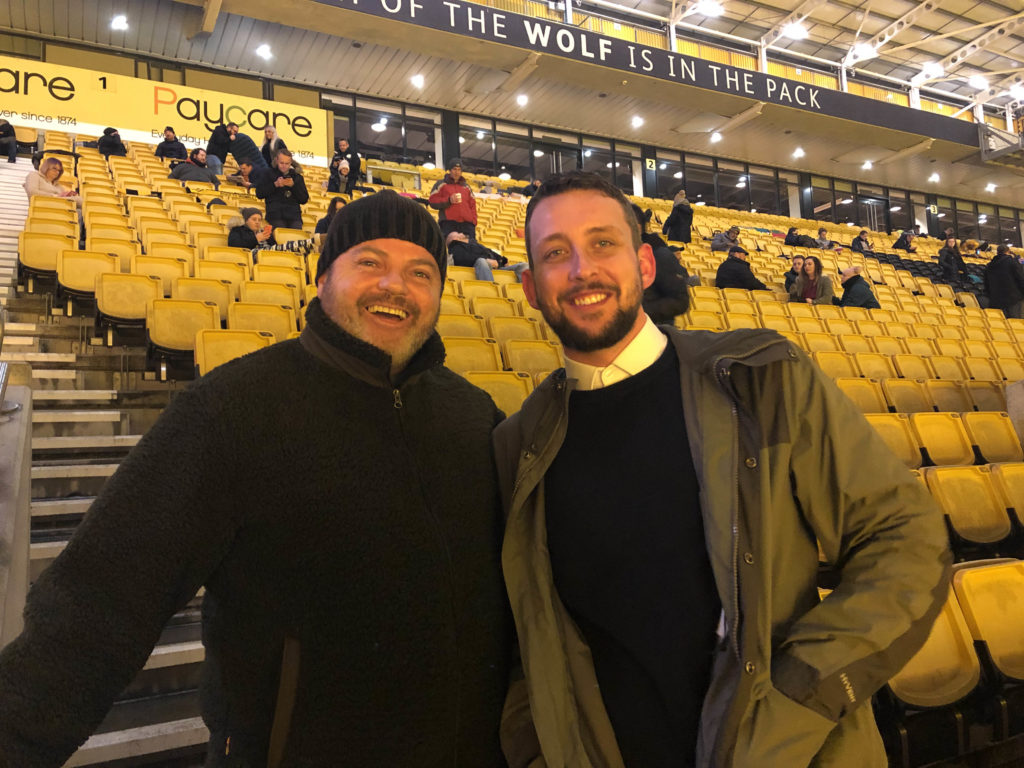
We had to gently persuade him to tell that story here, a tale of hope and optimism, in exactly the same way as Good Shepherd Head of Operations Tom Hayden had to cajole Steve into standing in front of the several hundred people who congregated at Molineux last November to take part in that sponsored sleepout in conjunction with Wolves Foundation.
“Tom asked me to stand up and say a few words, and with all the people that were there, I am not sure I have ever been so nervous,” Steve recalls.
“I don’t go chasing people to tell them what has happened to me, but if people want me to share my experiences then I don’t mind.
“I just stood up and talked, and I have to say I was too scared to notice what reaction I was getting.
“When I finished, Tom told me it was brilliant, and I had so many people saying they had found it really worthwhile.
“Jaki Graham came over to say ‘well done’, which was a proper ‘wow’ moment for me, and everyone was just saying it was very powerful.
“I met so many great people that night – Carl Ikeme from Wolves, what a guy he is – and it was all quite overwhelming to be honest.
“But if what I am saying helps people, and perhaps shows people what can be achieved by being kind and listening to others, then that is all we can ask for.”
Steve knows there are many whom, like him, have come through the other side of addiction and mental health issues, and that there can be moments of magic amid the many and varied obstacles stand in their way as they do so.
“There is nothing better than seeing someone move away from that despair and powerlessness towards starting to liven up and have a spirit again, getting some structure in their life and taking some responsibility,” he says.
“I love seeing that transition.
“The Good Shepherd were involved in an art exhibition last year at the Light House, and one of the guys we were helping who had never drawn anything before in his life, exhibited a piece of his artwork.
“And do you know what? Someone only went and bought it!
“He is a lovely guy, and to see that look on his face when someone had actually bought a piece of his work was incredible, he was so proud of himself.
“You could just see he was starting that process of having a sense of purpose and a sense of worth, and setting off on that journey which I had been on after my serious addiction problems all those years ago.”
Having been so close to death, having once walked out of hospital on a drip to find drugs because his addiction had become so powerful, the poignancy is not lost on what Steve says next when discussing how to emerge from such a miserable existence and somehow rediscover that feeling of worth and increased self-esteem.
“It’s about becoming alive again, that’s what it is…”
- Can you help us – and Steve – help those who visit us and need our support? Please click here if you are able to make a one-off donation or email [email protected] if you are able to consider making a regular monthly donation to the work of the Good Shepherd. Thank you.
PICTURES: Stuart Manley Photography